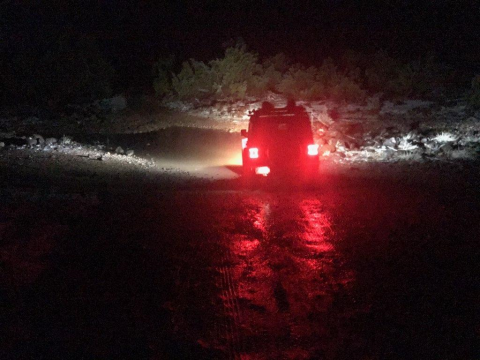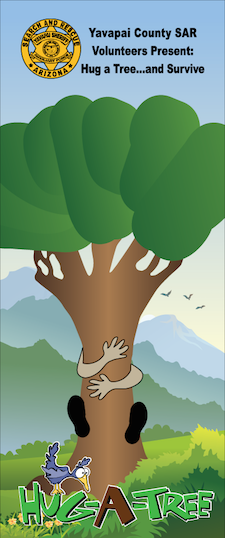Another Successful Search and Rescue thanks to our Dedicated Volunteers

On December 27, 2019, around 9:15 AM, deputies were dispatched to the Juniper Woods community south of Ash Fork regarding a missing 57-year-old man. The caller indicated his roommate had been missing since the previous afternoon, but had failed to call until now. The missing man walked away from a trailer on their property and could not be found.
A YCSO Forest Patrol deputy called out members of the Yavapai County Search and Rescue Team’s (YCSRT) 4x4 and Back Country units.
The Back Country team began tracking probable footprints in snow and mud which lead north through rugged juniper terrain. The 4x4 team worked a containment search intending to eliminate possible routes leading away from the missing man’s last know position. Rescuers noted several roads were extremely muddy and rutted in many areas, which provided a challenge to the teams. As the day was nearing sunset with a pending snowstorm soon to arrive, rescuers found him inside an abandoned camper shell at an old hunting camp. He had spent the previous night huddled next to a small campfire he managed to build and was without food and water since the previous day.
When found, the man was shivering and exhibiting confusion and weakness resulting from apparent hypothermia. Rescuers learned he had been trying to walk back to his trailer but did not realize he was going in the wrong direction.
Even though the search was winding down due to darkness, the dedicated teams continued following footprint tracks and eventually checked the old hunting camp where the tracks ended and found him. Another night in these conditions would have been extremely difficult with limited chances of survivability.
LESSONS – Time is the enemy of survival for search teams. It is critical that contact with the Sheriff’s Department be made quickly once it is determined someone is missing, especially under difficult weather conditions. Roommates had earlier conducted their own search prior to calling the Sheriff’s Office and placed themselves at risk as a result. Lastly, if lost, it is always best to remain stationary and let rescuers come to you. Generally, attempts to ‘self-rescue’ create more difficulty for search teams when you do not remain in one place while increasing your risk of injury or death when attempting to traverse unfamiliar terrain.






































